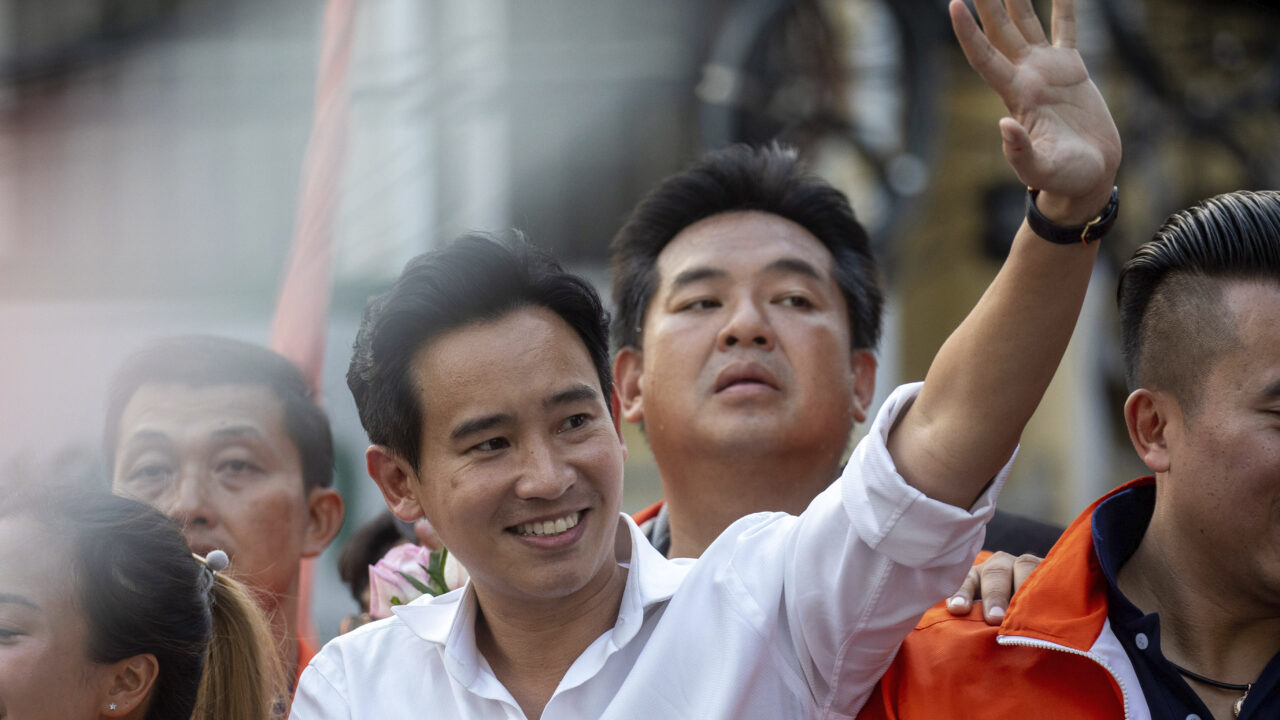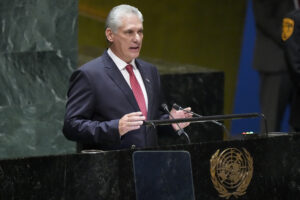On the Thai Elections
The monarchy needs the army to safeguard the throne and the army needs the king to justify its role in politics. The monarchy needs the army to safeguard the throne and the army needs the king to justify its role in politics.
The monarchy needs the army to safeguard the throne and the army needs the king to justify its role in politics.
I was among many Thais who celebrated the outcome of the federal elections this May, in which the Move Forward Party won the most seats in the House of Representatives—151 out of a possible 500 contested. My happiness was political, but also personal. The verdict made it seem that I could return to my home country, from which I’ve been banned since the 2014 coup, when the military and monarchy combined to overthrow Thailand’s last democratically elected government, led by Yingluck Shinawatra. My crime then was violating Article 112 of the Criminal Code, also known as lèse-majesté law, which stipulates that anyone defaming the monarchy could be imprisoned for up to fifteen years. I have long been a critic of the Thai conservative establishment, in particular the monarchy. As my following on social media grew, my writing and public statements struck the establishment as a threat. In the aftermath of the 2014 coup, the junta summoned me twice for “attitude adjustment.” I rejected the summons. Then they issued a warrant for my arrest and revoked my passport, forcing me to apply for a refugee status with Japan, where I have since been residing and teaching at Kyoto University. One of the Move Forward Party’s main campaign promises was to reform Article 112. For a few months this summer, then, it seemed my exile was set to end.
The Move Forward Party responded to this growing public mobilization by not only proposing to amend the lèse-majesté law, but also reform of the military.
For that matter, it even seemed that democracy might return to Thailand. The Move Forward Party is a reincarnation of the Future Forward Party, which was disbanded at the order of the Constitutional Court in 2020, in what was widely believed to be a politically motivated verdict. Many of its supporters had participated in the youth protests that year, which took aim at the oversized royal prerogatives and demanded immediate reforms—the first time ever that the monarchy’s status has been so questioned. The Move Forward Party responded to this growing public mobilization by not only proposing to amend the lèse-majesté law, but also reform of the military.
That it was a popular agenda was made clear by Move Forward’s tremendous showing in the elections. However, three months on, they have been relegated to the opposition, after the party’s leader, Pita Limjaroenrat, failed to secure the approval votes for his premiership. For Pita to become prime minister, he had to gain more than half of the combined 500 seats in the House of Representatives and 250 of the Senate. All members of the latter body are appointed by the military—an antidemocratic infrastructure put in place by the army after the last coup. The failure of Pita killed his party’s chance to access political power. Instead, the Pheu Thai Party of the Shinawatras, the runners-up in the election, has aligned itself with former enemies in the conservative camp, to form the next coalition government. This arrangement has paved the way for the homecoming of former prime minister Thaksin Shinawatra, who has lived in exile in Dubai since a coup in 2006. Thaksin returned to Thailand on 22 August, the same date as Pheu Thai’s candidate for Prime Minister, Srettha Thavisin, was approved. The faces in government have changed, but power remains in the same hands.
* * *
The monarchy has long cast its baleful shadow over Thai politics. Reigning uninterrupted for more than two centuries, the current dynasty has weathered many challenges, from colonial incursions in the nineteenth century, the abolition of absolutist rule in 1932, and a communist insurgency during the Cold War. Ascending the throne in 1946, King Bhumibol Adulyadej ruled for seventy years, in that period saving the monarchy from the point of near-collapse caused by the earlier abolition, and transforming it into the country’s most powerful political institution. Bhumibol’s success largely came to down to his ability to build a mutually beneficial relationship with the military. The monarchy needs the army to safeguard the throne, and the army needs the king to justify its role in politics.
Bhumibol’s death in 2016 marked a turning point. Born in 1952, his successor Vajiralongkorn was a spoiled prince, flashing his wealth and engaging in polygamy. As a king, he has been more open than Bhumibol about his political ambition. Soon after being crowned, he requested the constitution to be amended to augment his royal power; this was basically to allow him to reside overseas without having to appoint a regent to foresee royal affairs in Thailand on his behalf. In other words, to rule from afar. He also transferred certain military regiments under his own direct control and took a sole possession of the extraordinarily wealthy Crown Property Bureau, making him the richest monarch in the world, with an estimated value of $30–60 billion.
By February 2023, there were 1,895 people being politically prosecuted in 1,180 cases.
The last years of Bhumibol coincided with the emergence of a new generation in Thailand, which grew up during a time in which the royal propaganda started to subside. Around this time too, the emergence of social media served to expand political horizons, showing young Thais how people fought for democracy in other parts of the world. Soon enough, Thai students were taking to social media to challenge the monarchy as well. I know this well as I run one of the country’s largest Facebook groups, “The Royalist Marketplace,” which at present has some 2.3 million members. Set up in April 2020, the group promotes critical discussion about the monarchy. Most members are students or youth. They were evidently being radicalized, as the Thai government eventually deemed our group as a serious threat to national security and reached out to Facebook to geo-block us. The company obliged. But I soon opened a new group under the same name, which is still accessible in Thailand.
The result of this experiment in cyberspace and through social media was startling. Young Thais now possess different ideas about legitimacy, political power, accountability, and transparency. This phenomenon gave birth to several youth movements demanding for political reform of the Thai political structure. They have been active both on the streets and, particularly, online. Social movements showed they were willing to confront the elephant in the room when they staged a series of protests against the monarchy in 2020, despite the risk of a brutal crackdown and charges of lèse-majesté. The royal response was predictably blunt. Although Vajiralongkorn endorsed the moratorium of Article 112 in late 2017 as an attempt to reinvent his image of a reasonable king, he backtracked and resuscitated the law in 2020.
By February 2023, there were 1,895 people being politically prosecuted in 1,180 cases. Among these, 233 were charged under the lèse-majesté law. Most cases pertained to open defamation of the monarchy, but charges were sometimes filed on more obscured grounds, such as sharing posts online. Perhaps most absurdly, some people have been charged lèse-majesté for producing and selling calendars bearing the image of an inflatable duck in crop top (Vajiralongkorn was seen wearing a crop top while strolling the streets of Munich). Currently, the youngest person accused of lèse-majesté is a 15-year-old girl, Thanalop “Yok” Phalanchai, whose crime was participating in protests calling for the reform of Article 112. Amid the deterioration of human rights, the Move Forward Party took it upon itself to bring the people’s mandate to parliament. The monarchy’s harsh response was an indication of its vulnerability. In addition to blocking the party’s victory, it has accused Pita of financial fraud. His status as a member of parliament has been suspended. It is possible that the Move Forward Party could be dissolved on the ground that it supported the reform of Article 112.
* * *
That the monarchy and army have gotten together to subvert Thai democracy is depressing but not surprising. Harder to understand is why the international community has remained silent. It is true that the spokesperson of the US State Department expressed his concern over the political deadlock in Thailand. But no concrete measures have thus far been drawn up to assist democratic movements. Why?
It has been more than a decade now since I began my advocacy on democracy and human rights in Thailand. In this time I have travelled thousands of miles, through the United States, Europe, and Australia, seeking support for promoting democracy and human rights in my home country. In 2021, I launched a campaign called “112WATCH,” to raise an awareness on the misuse of lèse-majesté law. Yet I have received little support from the Western democratic governments. The major obstacle lies in their unbending perception that the Thai monarchy is an untouchable institution. Western governments worry that interfering in the issue of Article 112 could push Thailand into the warm embrace of China, which has happened anyway. The growing intimate relationship between Thailand and China will not bode well for the future of Thai democracy.
Previous Thai protest movements have been met with state violence, as in 1973, 1976, 1992, and 2010. I pray that this story does not repeat itself. Rather, I will end on a more positive note. The youth protests and the electoral victory of the Move Forward Party have made Thailand a different place. Even if their political efforts dissipate, nobody can reverse this process of democratization. The genie is out of the bottle. In the meanwhile, I will continue to advocate for a greater democracy, which includes the reform of the monarchy, and the protection of human rights in my home country. My advocacy will continue whether I am allowed to return home or not.
Your support matters…Independent journalism is under threat and overshadowed by heavily funded mainstream media.
You can help level the playing field. Become a member.
Your tax-deductible contribution keeps us digging beneath the headlines to give you thought-provoking, investigative reporting and analysis that unearths what's really happening- without compromise.
Give today to support our courageous, independent journalists.






You need to be a supporter to comment.
There are currently no responses to this article.
Be the first to respond.